|
[Majorityrights Central] After Casey and the ensuing child sexual exploitation inquiry Posted by Guessedworker on Tuesday, 17 June 2025 00:21. [Majorityrights News] 4 minutes and 43 seconds of drone warfare history - updated Posted by Guessedworker on Wednesday, 04 June 2025 16:50. [Majorityrights Central] An approaching moment of Russian clarity Posted by Guessedworker on Sunday, 11 May 2025 12:34. [Majorityrights Central] “It’s started. You ignored us. See where it’s going to get you.” Posted by Guessedworker on Sunday, 04 May 2025 00:42. [Majorityrights News] Another dramatic degradation of Russia’s combat capacity Posted by Guessedworker on Wednesday, 23 April 2025 08:49. [Majorityrights Central] A British woman in Ukraine and an observer of Putin’s war Posted by Guessedworker on Monday, 14 April 2025 00:04. [Majorityrights News] France24 puts an end to Moscow’s lie about the attack on Kryvyi Riy Posted by Guessedworker on Monday, 07 April 2025 17:02. [Majorityrights News] If this is an inflection point Posted by Guessedworker on Thursday, 03 April 2025 05:10. [Majorityrights News] Sikorski on point Posted by Guessedworker on Friday, 28 March 2025 18:08. [Majorityrights Central] Piece by peace Posted by Guessedworker on Wednesday, 19 March 2025 08:46. [Majorityrights News] Shame in the Oval Office Posted by Guessedworker on Saturday, 01 March 2025 00:23. [Majorityrights News] A father and a just cause Posted by Guessedworker on Tuesday, 25 February 2025 23:21. [Majorityrights Central] Into the authoritarian future Posted by Guessedworker on Friday, 21 February 2025 12:51. [Majorityrights Central] On an image now lost: Part 2 Posted by Guessedworker on Saturday, 15 February 2025 14:21. [Majorityrights News] Richard Williamson, 8th March 1940 - 29th January 2025 Posted by Guessedworker on Monday, 03 February 2025 10:30. [Majorityrights Central] Freedom’s actualisation and a debased coin: Part 2 Posted by Guessedworker on Saturday, 11 January 2025 01:08. [Majorityrights News] KP interview with James Gilmore, former diplomat and insider from first Trump administration Posted by Guessedworker on Sunday, 05 January 2025 00:35. [Majorityrights Central] Aletheia shakes free her golden locks at The Telegraph Posted by Guessedworker on Saturday, 04 January 2025 23:06. [Majorityrights News] Former Putin economic advisor on Putin’s global strategy Posted by Guessedworker on Monday, 30 December 2024 15:40. [Majorityrights News] Trump will ‘arm Ukraine to the teeth’ if Putin won’t negotiate ceasefire Posted by Guessedworker on Tuesday, 12 November 2024 16:20. [Majorityrights News] Olukemi Olufunto Adegoke Badenoch wins Tory leadership election Posted by Guessedworker on Saturday, 02 November 2024 22:56. [Majorityrights News] What can the Ukrainian ammo storage hits achieve? Posted by Guessedworker on Saturday, 21 September 2024 22:55. [Majorityrights Central] An Ancient Race In The Myths Of Time Posted by James Bowery on Wednesday, 21 August 2024 15:26. [Majorityrights Central] Slaying The Dragon Posted by James Bowery on Monday, 05 August 2024 15:32. [Majorityrights Central] The legacy of Southport Posted by Guessedworker on Friday, 02 August 2024 07:34. [Majorityrights News] Farage only goes down on one knee. Posted by Guessedworker on Saturday, 29 June 2024 06:55. [Majorityrights News] An educated Russian man in the street says his piece Posted by Guessedworker on Wednesday, 19 June 2024 17:27. [Majorityrights Central] Freedom’s actualisation and a debased coin: Part 1 Posted by Guessedworker on Friday, 07 June 2024 10:53. [Majorityrights News] Computer say no Posted by Guessedworker on Thursday, 09 May 2024 15:17. [Majorityrights News] Be it enacted by the people of the state of Oklahoma Posted by Guessedworker on Saturday, 27 April 2024 09:35. [Majorityrights Central] Ukraine, Israel, Taiwan … defend or desert Posted by Guessedworker on Sunday, 14 April 2024 10:34. [Majorityrights News] Moscow’s Bataclan Posted by Guessedworker on Friday, 22 March 2024 22:22. [Majorityrights News] Soren Renner Is Dead Posted by James Bowery on Thursday, 21 March 2024 13:50. [Majorityrights News] Collett sets the record straight Posted by Guessedworker on Thursday, 14 March 2024 17:41. Majorityrights News > Category: Military MattersManafort conspired with Israeli Officials & ‘Obama’s Jews’ to weaponize anti-Semitsm against Ukraine
“Western countries need to study these Chinese techniques and adopt them.” Not adopt them. Whites need to adapt ruthless ferocity to the ethnonationalist cause. In the two examples, one would be correct, and one would not. Where Islamic incursions are quelled, that is correct. Going to an African country, enslaving them, beating them and so on - when it is not sheer self defense - is not. But of course, such bad advice (e.g., that we should be brutal slave masters over Africans) is typical of right wing reactionaries - to look for a foundation in natural fallacy, in sheer might makes right supremacism beyond the complexity of social praxis. ...and, of course, when praxis is ignored, then broader patterns of nemesis correction are in store for the hubris. Related at Majorityrights: Imperative to replace Golden Rule of Altruism w Silver Rule of Reciprocity for European Moral Order
Related at Majorityrights: Alternative for Sweden

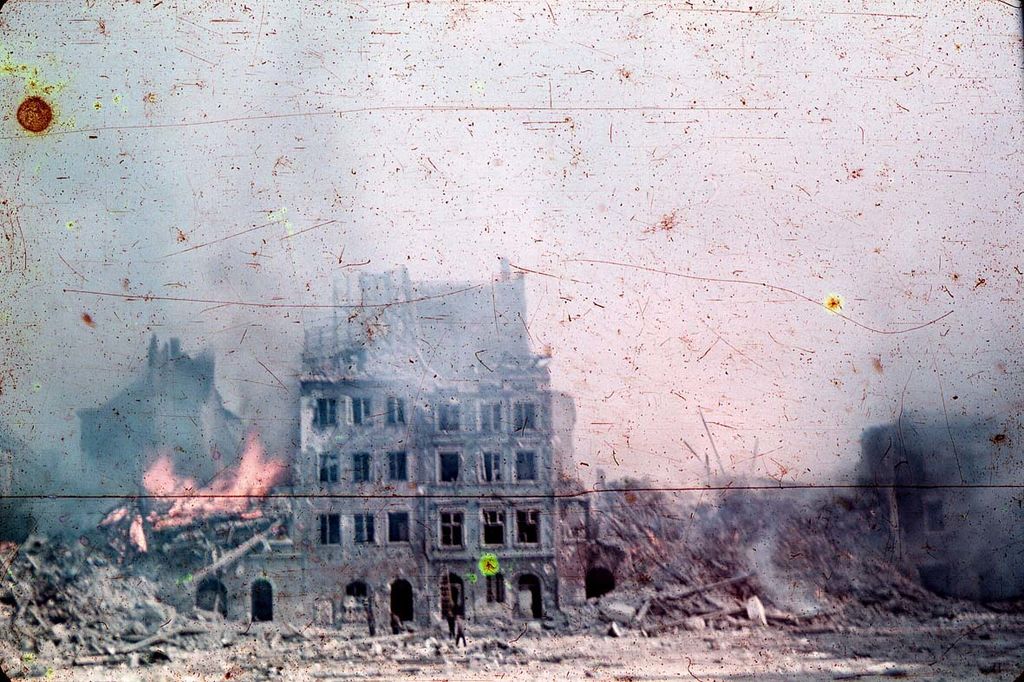 Ewa Faryaszewska (1920-1944) - Museum of Warsaw, Public Domain Ewa Faryaszewska (1920-1944) - Museum of Warsaw, Public DomainGenerally speaking, I don’t like to go into World War II, because I view it as a nasty history for Europeans, about which few people alive had anything to do - therefore, I prefer to uncouple the ethnonationalist cause from it - and especially from Nazism - for the sake of Germans perhaps especially. However, because a needless and counterproductive tendency to try to fully exonerate and redeem Hitler and the Nazis persists - e.g., Mark Collette and “ComfyTangent” recommending that people attend to the schlock revisionism of “The Greatest Story Never Told”; David Duke persisting in blaming anyone but Hitler for WWII - there is yet need to address the issue enough to put it to rest for anyone reasonable - not something to expect from the Stormfront crowd, e.g; and many have not yet gotten Dr. Lindtner’s message regarding the disingenuousness of Faurisson and other revisionists. We will be engaging podcasts on the matter with a Swedish colleague, et al. in days to come to straighten-out the record on WWII - why White Nationalism need not and should no be burdened with Hitler/Nazi association, denial, let alone its idealization and idolatry. In the meantime, while you will hear a great deal from American White Nationalists about the terrible fire-bombing of Dresden, you can expect them to remain irresponsibly silent (or make revolting excuses) regarding events like the quelling of the 1944 Warsaw Uprising. If anyone has better information to add, they are welcome, but again, because I don’t like going into WWII history, at this point I’ll merely set forth a textual sketch of the event from Wikipedia and this video:
 Polish resistance: Berlin 1st Army: 5,660 casualties[7] 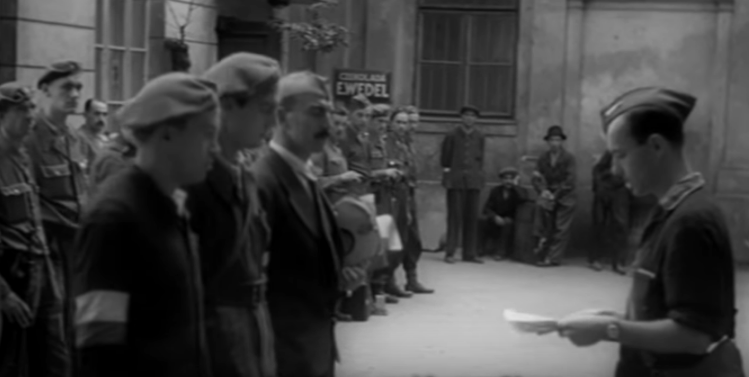 Poland 1944–45: The Warsaw Uprising (Polish: powstanie warszawskie; German: Warschauer Aufstand) was a major World War II operation, in the summer of 1944, by the Polish underground resistance, led by the Home Army (Polish: Armia Krajowa), to liberate Warsaw from German occupation. The uprising was timed to coincide with the retreat of the German forces from Poland ahead of the Soviet advance.[9] While approaching the eastern suburbs of the city, the Red Army temporarily halted combat operations, enabling the Germans to regroup and defeat the Polish resistance and to raze the city in reprisal. The Uprising was fought for 63 days with little outside support. It was the single largest military effort taken by any European resistance movement during World War II.[10] 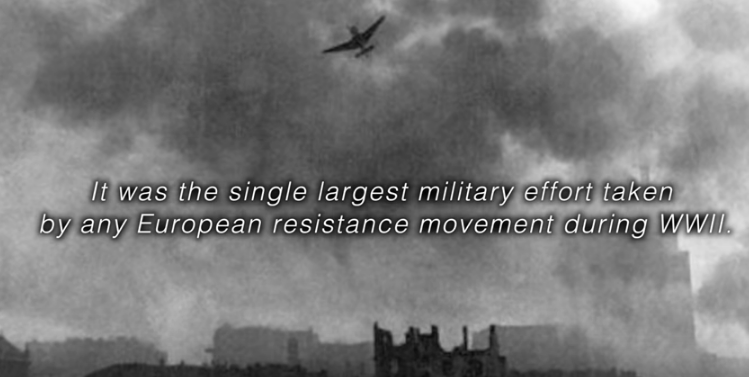 The Uprising began on 1 August 1944 as part of a nationwide Operation Tempest, launched at the time of the Soviet Lublin–Brest Offensive. The main Polish objectives were to drive the Germans out of Warsaw while helping the Allies defeat Germany. An additional, political goal of the Polish Underground State was to liberate Poland’s capital and assert Polish sovereignty before the Soviet-backed Polish Committee of National Liberation could assume control. Other immediate causes included a threat of mass German round-ups of able-bodied Poles for “evacuation”; calls by Radio Moscow’s Polish Service for uprising; and an emotional Polish desire for justice and revenge against the enemy after five years of German occupation.[11][12] 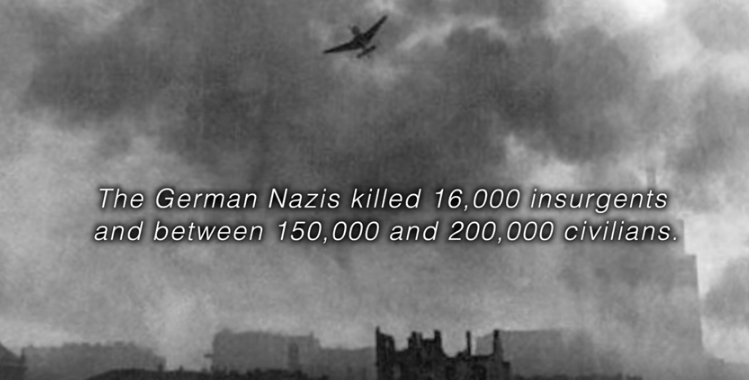 Initially, the Poles established control over most of central Warsaw, but the Soviets ignored Polish attempts to maintain radio contact with them and did not advance beyond the city limits. Intense street fighting between the Germans and Poles continued. By 14 September, the eastern bank of the Vistula River opposite the Polish resistance positions was taken over by the Polish troops fighting under the Soviet command; 1,200 men made it across the river, but they were not reinforced by the Red Army. This, and the lack of air support from the Soviet base five-minute flying time away, led to allegations that Stalin tactically halted his forces to let the operation fail and the Polish resistance to be crushed. Arthur Koestler said the Soviet disposition will rank on an ethical level with Lidice.”[13] 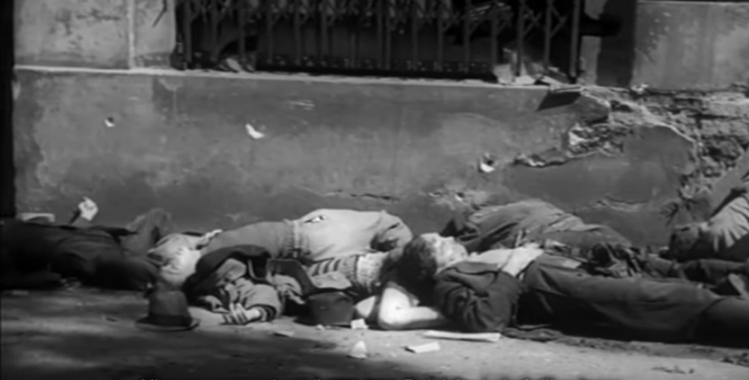 Winston Churchill pleaded with Stalin and Franklin D. Roosevelt to help Britain’s Polish allies, to no avail.[14] Then, without Soviet air clearance, Churchill sent over 200 low-level supply drops by the Royal Air Force, the South African Air Force, and the Polish Air Force under British High Command, in an operation known as the Warsaw Airlift. Later, after gaining Soviet air clearance, the U.S. Army Air Force sent one high-level mass airdrop as part of Operation Frantic. Although the exact number of casualties remains unknown, it is estimated that about 16,000 members of the Polish resistance were killed and about 6,000 badly wounded.  85% of Warsaw was destroyed deliberately by Hitler’s order that the city be razed. 85% of Warsaw was destroyed deliberately by Hitler’s order that the city be razed.In addition, between 150,000 and 200,000 Polish civilians died, mostly from mass executions. Jews being harboured by Poles were exposed by German house-to-house clearances and mass evictions of entire neighbourhoods. German casualties totalled over 8,000 soldiers killed and missing, and 9,000 wounded. During the urban combat approximately 25% of Warsaw’s buildings were destroyed. Following the surrender of Polish forces, German troops systematically levelled another 35% of the city block by block. Together with earlier damage suffered in the 1939 invasion of Poland and the Warsaw Ghetto Uprising in 1943, over 85% of the city was destroyed by January 1945, when the course of the events in the Eastern Front forced the Germans to abandon the city.
Page 23 of 59 | First Page | Previous Page | [ 21 ] [ 22 ] [ 23 ] [ 24 ] [ 25 ] | Next Page | Last Page |
|

Existential IssuesDNA NationsCategoriesContributorsEach author's name links to a list of all articles posted by the writer. LinksEndorsement not implied. Immigration
Islamist Threat
Anti-white Media Networks Audio/Video
Crime
Economics
Education General
Historical Re-Evaluation Controlled Opposition
Nationalist Political Parties
Science Europeans in Africa
Of Note MR Central & News— CENTRAL— An approaching moment of Russian clarity by Guessedworker on Sunday, 11 May 2025 12:34. (View) Piece by peace by Guessedworker on Wednesday, 19 March 2025 08:46. (View) — NEWS — If this is an inflection point by Guessedworker on Thursday, 03 April 2025 05:10. (View) Sikorski on point by Guessedworker on Friday, 28 March 2025 18:08. (View) CommentsJames Bowery commented in entry 'Slaying The Dragon' on Wed, 02 Apr 2025 16:44. (View) Thorn commented in entry 'Sikorski on point' on Wed, 02 Apr 2025 11:29. (View) Guessedworker commented in entry 'Sikorski on point' on Tue, 01 Apr 2025 17:24. (View) Thorn commented in entry 'Sikorski on point' on Tue, 01 Apr 2025 13:59. (View) Guessedworker commented in entry 'Sikorski on point' on Tue, 01 Apr 2025 13:18. (View) Thorn commented in entry 'Sikorski on point' on Tue, 01 Apr 2025 12:08. (View) Guessedworker commented in entry 'Sikorski on point' on Tue, 01 Apr 2025 04:49. (View) Thorn commented in entry 'Sikorski on point' on Tue, 01 Apr 2025 00:28. (View) Thorn commented in entry 'Sikorski on point' on Mon, 31 Mar 2025 23:47. (View) Guessedworker commented in entry 'Sikorski on point' on Mon, 31 Mar 2025 23:24. (View) Thorn commented in entry 'Sikorski on point' on Mon, 31 Mar 2025 20:55. (View) Thorn commented in entry 'Sikorski on point' on Mon, 31 Mar 2025 20:52. (View) Guessedworker commented in entry 'Sikorski on point' on Sun, 30 Mar 2025 23:59. (View) Guessedworker commented in entry 'Sikorski on point' on Sun, 30 Mar 2025 23:34. (View) Thorn commented in entry 'Sikorski on point' on Sun, 30 Mar 2025 23:33. (View) Thorn commented in entry 'Sikorski on point' on Sun, 30 Mar 2025 22:52. (View) Guessedworker commented in entry 'Sikorski on point' on Sun, 30 Mar 2025 21:43. (View) Thorn commented in entry 'Sikorski on point' on Sun, 30 Mar 2025 11:38. (View) Thorn commented in entry 'Piece by peace' on Fri, 28 Mar 2025 20:46. (View) Guessedworker commented in entry 'Piece by peace' on Fri, 28 Mar 2025 17:52. (View) Thorn commented in entry 'Piece by peace' on Fri, 28 Mar 2025 12:03. (View) Guessedworker commented in entry 'Piece by peace' on Thu, 27 Mar 2025 22:47. (View) Thorn commented in entry 'Piece by peace' on Thu, 27 Mar 2025 21:24. (View) Guessedworker commented in entry 'Piece by peace' on Thu, 27 Mar 2025 20:07. (View) Thorn commented in entry 'Piece by peace' on Thu, 27 Mar 2025 19:29. (View) Guessedworker commented in entry 'Piece by peace' on Thu, 27 Mar 2025 16:13. (View) Thorn commented in entry 'Piece by peace' on Thu, 27 Mar 2025 15:20. (View) Thorn commented in entry 'Piece by peace' on Thu, 27 Mar 2025 14:32. (View) Guessedworker commented in entry 'Piece by peace' on Thu, 27 Mar 2025 13:57. (View) Thorn commented in entry 'Piece by peace' on Thu, 27 Mar 2025 12:15. (View) Thorn commented in entry 'Piece by peace' on Thu, 27 Mar 2025 11:36. (View) Guessedworker commented in entry 'Piece by peace' on Thu, 27 Mar 2025 00:42. (View) Thorn commented in entry 'Piece by peace' on Wed, 26 Mar 2025 21:52. (View) Thorn commented in entry 'Piece by peace' on Wed, 26 Mar 2025 21:38. (View) Manc commented in entry 'A father and a just cause' on Wed, 26 Mar 2025 10:56. (View)  
|